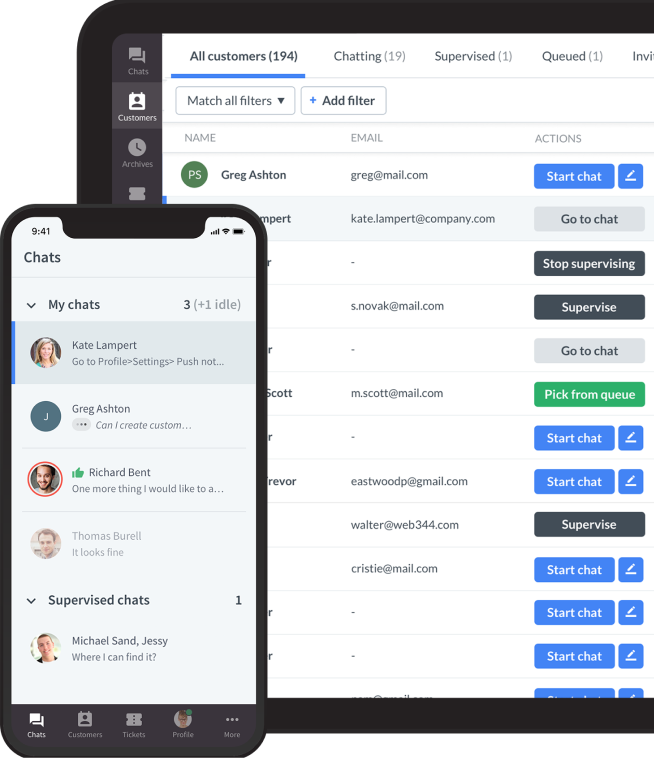
Do you know how many consumers would pay a higher price for good customer service?
In fact, studies show that 86% of customers are willing to pay more for a better customer experience, a testament to the critical role customer service plays in building trust, loyalty, and long-term success.
But what does "good customer service" really mean, especially if you're applying for a job in the field?
For job seekers looking to break into the customer service field or advance their careers, understanding how to define excellent customer service is essential. More than that, articulating your understanding in an interview can set you apart as a candidate who knows the theory and is ready to put it into practice.
This article will explore the fundamentals of providing excellent customer service and how to craft an impressive response to the question, "What does good customer service mean to you?"
Whether you're preparing for an interview or simply want to deepen your understanding of this vital skill, we've got you covered.

What are five qualities of good customer service?
Good customer service is all about making customers feel heard, valued, and cared for.
It means going beyond just meeting their needs — you're creating an experience that makes them want to come back for more.
Whether it's solving a problem quickly or adding a personalized service, it's about building trust and improving customer satisfaction.
Check out some of the good customer service tips that we compiled for you:
Empathy
Put yourself in the customer's shoes. Showing that you care can make all the difference, whether they're frustrated or just need help. A little understanding can turn an angry person into a loyal client. Simply listening to customer concerns and validating their feelings can immediately lower tensions and set the tone for a positive interaction.
Clear communication
Talk to customers in a way that's easy to understand, polite, and professional while practicing active listening to truly grasp their concerns and needs. Nobody likes to be confused or talked down to. Clarity and attentive listening reduce misunderstandings and speed up problem resolution. It also helps customers feel confident in your ability to help them, which builds trust and stronger relationships.
Flexibility
Not every situation is the same. Demonstrating adaptability and quick thinking reassures customers that you’re committed to going above and beyond for them. From bending policies to solving unique problems to coming up with creative solutions, flexibility shows that you care about your customers as individuals. Often, these personalized responses stick with clients and keep them coming back.
Problem-solving
Customers come to you for answers. Handling their issues quickly and effectively solves the problem and leaves them with a good impression. Being proactive and resourceful can often prevent problems from escalating. Clients remember when someone went out of their way to resolve an issue with care and efficiency.
Accountability
If something goes wrong, owning it and making it right goes a long way. People appreciate honesty and follow-through. Avoiding blame and focusing on finding a solution shows integrity and professionalism. It's also a chance to turn a bad situation into a positive experience by demonstrating your commitment to customer satisfaction.
Going the extra mile
Small gestures, like personalizing a recommendation, offering a thoughtful follow-up, or providing a surprise solution, can turn a good experience into a great one. Taking a proactive approach, such as anticipating customer needs or addressing potential issues before they arise, enhances the overall interaction. It's the unexpected touches that people remember and share with others, reinforcing customer loyalty and your reputation.
LiveChat can automate follow-up messages and surveys, making it easy to gather feedback and ensure customer satisfaction.
Examples of good customer relationship management
Correctly fixing mistakes can turn a frustrating experience into a positive, memorable one. Consider a restaurant that mistakes an order. While the initial mistake may upset the customer, a manager who steps in with a sincere apology, a free dessert, and a discount for their next visit can completely change the customer's perspective. Instead of leaving angry, you make customers happy and more likely to return.
Similarly, going beyond your basic responsibilities to help customers before they even realize they need help shows a level of attentiveness that truly stands out. Take the example of a software company that notices a glitch in a customer's account. Instead of waiting for the customer to discover the problem, they proactively reach out with a solution, leaving the customer feeling cared for and impressed by the company's commitment.
Adding a personal touch takes customer service to the next level. Imagine a store associate who recognizes a repeat customer, remembers their preferences, and offers suggestions tailored to their tastes. This small but thoughtful gesture makes the customer feel truly valued as if they are more than just another sale.
The role of customer service in business and why it matters
Good customer service helps build strong relationships, improves customer retention, and creates a solid reputation that attracts new business.
For anyone starting out in customer support, knowing how much of an impact you can make shows just how important your role is. By putting these ideas into practice, you'll help your company grow and gain skills that can take you far in your career.
How would you define great customer service? At its core, outstanding customer service is about creating value for everyone — customers, companies, and those who provide the service.
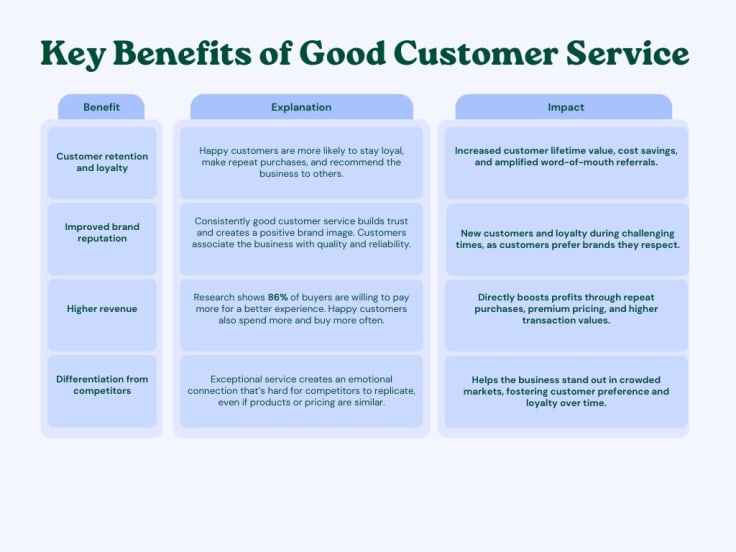
Companies with excellent customer service really shine by always going the extra mile to make customers happy. Brands like Amazon, Ritz-Carlton, and Zappos are known for putting customers first, responding quickly, and offering personalized solutions. They focus on listening to customers' needs, communicating clearly, and solving problems before they become bigger issues.
Remember that effective customer interactions are at the heart of delivering an exceptional customer experience. A service interaction through phone support, email, or other channels customers prefer plays a crucial role in building relationships. Prioritizing clear communication and personalized solutions creates loyal customers. At the same time, a strong focus on consistent interactions improves the customer experience.
Why do interviewers ask about excellent customer service?
Knowing what good customer service is and being able to explain it clearly are two different things.
That's why this question comes up so often in interviews — it's your chance to show how you'd make a difference for the company and its customers. Employers know that customer service teams are the face of the business, so they want to see if you truly understand what it takes to create great customer experiences.
When they ask, "What does great customer service look like to you?" they're not just looking for a basic answer. They want to know if you can take those ideas and put them into action. It's a way for them to see if you're the right fit for their team and the whole company. One of the main reasons for asking this question is to gauge your understanding of customer service principles.
It's not enough to know that customer service is about being helpful. Interviewers want to see if you understand the deeper aspects, such as empathy, problem-solving, and relationship-building.
They're looking for someone who understands that great service goes beyond the basics and creates meaningful experiences for customers.
Another important reason is to assess your ability to represent the company in a positive way. As a customer service professional, you're often the face of the business. Your tone, demeanor, and approach can leave a lasting impression — good or bad. By asking this question, interviewers want to know if you can align yourself with their brand's voice and values, ensuring that customers feel valued and respected whenever they interact with you.
Finally, this question helps employers identify essential skills like empathy, communication, and teamwork. They want to see if you can stay calm and handle tough situations without getting flustered. It's also a way of verifying if you can explain things clearly and get your point across. All of this shows that you can tackle challenges and come up with the best solutions.
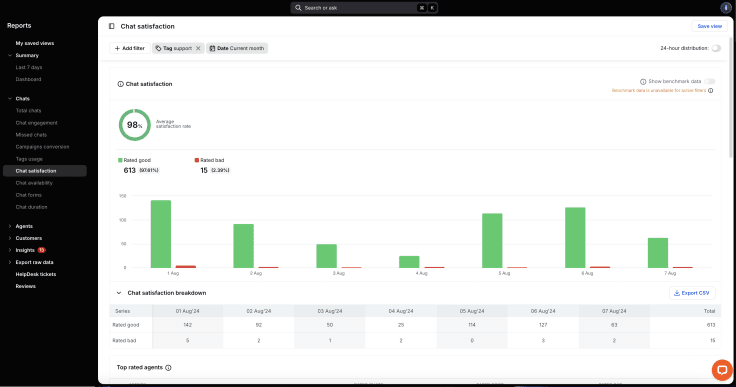
How to craft a strong answer in an interview
When preparing for a customer service interview, crafting a strong answer to the question, "What does good customer service mean to you?" requires more than a surface-level response.
Your answer should reflect a clear understanding of customer service principles while showing how your personal values and experiences align with the company's approach.
Here's how you can put together a winning response.
Understand the company's customer service philosophy
Start by researching the company's values and their approach to customer service. Look at their website, social media, and customer reviews to understand how they interact with their customers. Do they emphasize fast and efficient service? Or is their focus on building strong, personal relationships?
Aligning your answer with their philosophy shows you've done your homework and are serious about fitting into their team.
Link your values to their standards
Once you understand the company's priorities, think about how your own approach to customer service lines up with theirs. If they value personalized interactions, mention how you focus on understanding customer needs and delivering tailored solutions.
If they prioritize problem-solving, explain how you work quickly and efficiently to resolve issues. Highlighting this alignment makes your answer more genuine and relevant to the role.
Use specific examples
One of the best ways to make your answer stand out is by sharing real-life experiences. Think of a time when you demonstrated excellent customer service — whether it was resolving a tough issue, going the extra mile for a customer, or working as part of a team to deliver a great result.
Include specific details, like the problem, the steps you took, and how your actions impacted the customer. For example, you might describe how you turned an upset customer into a loyal advocate by showing empathy and finding a creative solution to their problem.
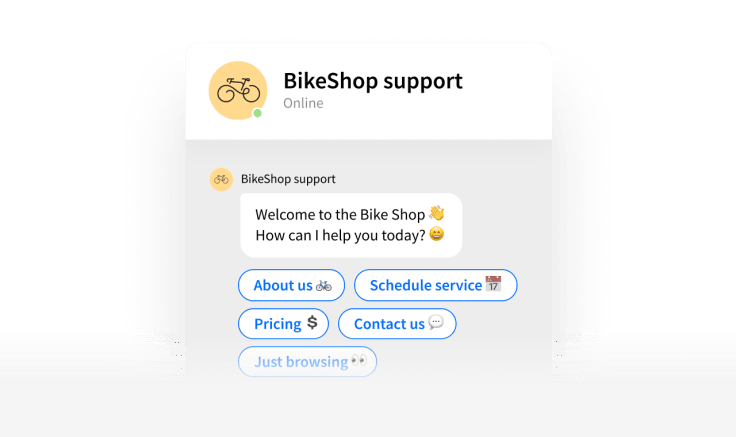
Key elements to include in your response
Great customer service skills are all about connecting with people and solving problems in a way that makes them happy. Being a good communicator is key. Just as important is listening carefully to find out exactly what they need.
Quick thinking will help you solve problems on the spot while staying calm and patient will keep things running smoothly, even when customers are upset.
As you craft your answer on how to deliver great customer service, make sure it includes these essential components:
Listen actively and communicate clearly
Good customer service starts with really listening to the customer. Don't just wait for your turn to talk — focus on what they're saying, ask follow-up questions if needed, and show them you understand their problem. For example, if a customer is upset about a delayed order, say something like, "I completely understand how frustrating this must be for you. Let me check on this right away." Acknowledging their feelings helps build trust.
Clear communication is just as important. Explain solutions in simple terms and check in to make sure they understand. If you're helping someone troubleshoot a product, avoid jargon they might not know and instead guide them step-by-step: "First, let's try restarting your device. Does that work? If not, I'll walk you through the next step."

Deliver practical solutions
Customers usually come to you because something's wrong, so being a quick and creative problem-solver is key. For instance, imagine a customer contacts you because their package hasn't arrived. Instead of just saying, "I'll look into it," dig deeper. Check the tracking, contact the shipping service, and let them know what's being done: "It looks like there was a delay at the warehouse. I've expedited a replacement for you, and it should arrive tomorrow.”
What makes you stand out is going a step further to fix the issue faster or in a way that exceeds customer expectations. If you're working in a restaurant and a customer's order is wrong, you might say, "I'll fix this right away. Would you like a complimentary appetizer while you wait?"
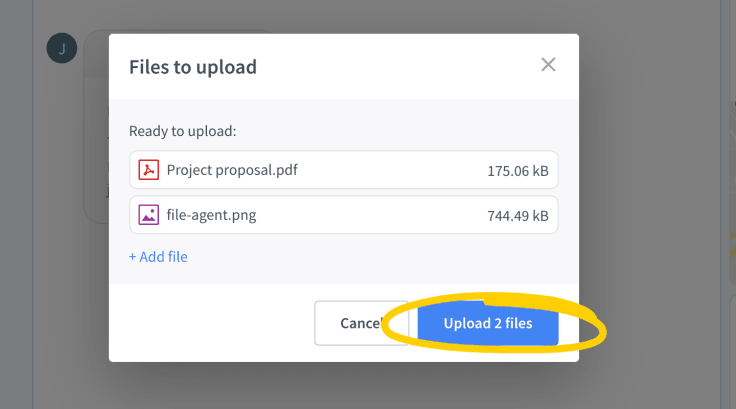
Make it personal and own the experience
Great service happens when you make things personal. Take the time to remember little details about your customers if they're regulars. For example, if someone frequently orders a certain coffee at your café, you might greet them with, "The usual today?" That small gesture creates satisfied customers.
Ownership is just as important when something goes wrong. If a customer reports an issue with their order, don't pass the blame or make excuses. Instead, own it and work to fix it. For instance, say, “I'm so sorry this happened. Let me personally take care of it for you and ensure it's resolved." Follow through and update them until the issue is fully resolved.
LiveChat enhances these principles by providing a personal touch through direct, one-on-one communication. Representatives can use the customer's name, acknowledge their concerns, and express understanding, making the interaction more personal and respectful.
Work together for better outcomes
Customer service is rarely a solo job. You often need to work with others to deliver the best experience. For example, if a customer has a problem that needs input from another department, take the lead in coordinating.
Instead of saying, “You'll need to talk to billing about this," you might say, "Let me connect with the billing team and get back to you with an update." This saves the customer from extra hassle and shows teamwork.
Dos and don'ts
Talking about good customer service qualities is your chance to show you understand what great service is and how you can bring it to the table. A good answer shows you're prepared, thoughtful, and ready to make a difference. But it's easy to slip up with generic or overly complicated replies.
Not sure how to say you have good customer service skills? Here's a quick rundown of what to do and what to avoid when tackling this question:
| Category | Dos | Donâts |
| Content | Be concise but specific in your answers. Focus on quality over quantity to make a clear impact. | Avoid generic or overused phrases like "I love helping people" without backing them up with substance or examples. |
| Examples | Use specific examples with measurable outcomes to showcase your skills and results (for example, "I resolved 95% of customer issues on the first call."). | Don't provide vague answers that lack detail or fail to demonstrate your real-world experience. |
| Enthusiasm | Reflect genuine enthusiasm for serving customers and show how much you value creating positive experiences. | Don't sound robotic or insincere â interviewers can tell when enthusiasm is forced or inauthentic. |
| Alignment | Research the company's customer service values and goals, then tailor your answer to align with them. | Don't ignore the company's specific approach to customer service. A generic answer may make you seem unprepared. |
| Problem-solving | Highlight how you approach challenges and resolve customer issues effectively and efficiently. | Don't focus solely on policies or procedures without showing how you bring a personal touch to your interactions. |
| Delivery | Speak confidently and clearly, using a conversational tone that feels natural but professional. | Don't ramble or over-explain â keep your response focused and relevant to the question. |
What is your definition of good customer service?
When faced with such a question during your interview, it's helpful to use real-life scenarios to illustrate your understanding.
Here are a few examples matched to different situations:
Retail scenario: handling a dissatisfied customer
"Good customer service means staying calm and empathetic, even when a customer is upset. For instance, I once helped a customer who was frustrated because the shoes they bought were defective. I listened carefully to their complaint, apologized for the inconvenience, and immediately offered a replacement.
“To show dedication, I gave them a discount on their next purchase. By the end of our interaction, they were smiling and thanked me for turning a bad experience into a positive one."
B2B scenario: solving a technical problem
"Good customer service means understanding the customer’s unique needs and providing tailored solutions. In a previous role, a client faced repeated system crashes during a crucial deadline. I identified the issue by asking detailed questions, explained the technical problem in plain terms, and offered a solution that included a temporary fix and a long-term upgrade.
“By following up regularly, I made sure they felt supported throughout the process. This not only solved the problem but also strengthened our relationship with the client."
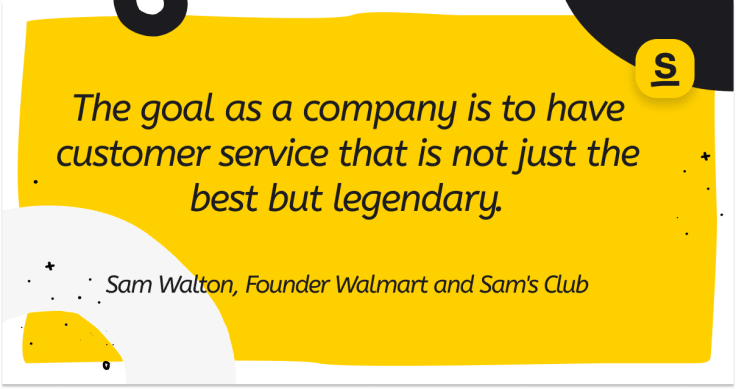
Healthcare scenario: showing empathy and precision
"Good customer service in healthcare means balancing empathy with accuracy. I remember assisting a patient who was anxious about a scheduling error that could delay their procedure. I reassured them that their concerns were valid, worked with the scheduling team to resolve the issue quickly, and personally called them with updates until everything was sorted.
“They thanked me for my kindness and thoroughness, and I knew I had made a difference in their experience."
LiveChat’s support philosophy
At LiveChat, we believe in taking customer service to the next level by focusing on understanding, empathy, and creating lasting positive impressions. Good customer service examples for interviews often showcase these qualities, highlighting how they contribute to meaningful customer interactions and long-term satisfaction.
Our Support Heroes embody these principles daily, bringing a human touch to every interaction. If you're wondering how to answer "What does good customer service mean to you?" take inspiration from one of our Support Heroes, who puts it this way:
“Delivering excellent customer service service isn’t just about giving answers; it’s about understanding the problem and solving it.”
We approach every conversation with a mindset of understanding the customer’s unique situation:
“Good customer service means understanding the customer. Actually getting their use-case and providing clear, tailored solutions. It’s throwing away the scripts and treating the customer on a personal level — how you’d like to be treated.”
Our Support Heroes also emphasize the importance of being proactive and knowledgeable:
“These are the qualities of a good customer service representative — they anticipate the customer’s needs, understand their use-case, and foresee any edge cases that might come up.”
This dedication goes beyond solving problems — it’s about building trust and ensuring customers feel valued.
“Good customer service is a whole customer experience, where interactions are easy and convenient, and service reps are friendly and knowledgeable. That’s why customers are happy and come back.”
At LiveChat, our commitment to creating conversations that anticipate needs and build lasting trust sets us apart.
This isn't just customer service — it's a customer experience designed to leave people feeling heard and understood.
Deliver great customer service
What does it mean to have good customer service?
Good customer service is all about creating positive, lasting impressions that make clients feel valued and supported. In interviews, giving a great customer service definition is your chance to show you get this.
Blend your personality with professionalism, share real examples, and align your approach with the company’s values. Most importantly, keep the customer-first mindset at the center of your response — showing that you truly care about solving problems and building customer loyalty.
At LiveChat, we're passionate about helping businesses deliver exceptional customer experiences. Our tools empower support teams to communicate seamlessly, anticipate customer needs, and create interactions that leave lasting impressions.
Ready to level up your customer service game? Check out our tips for good customer service and see how LiveChat can help you make it happen today!

